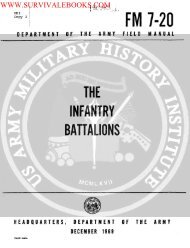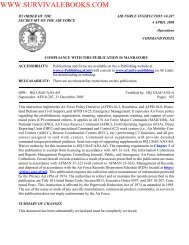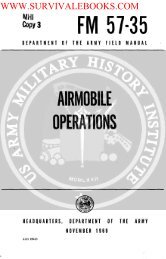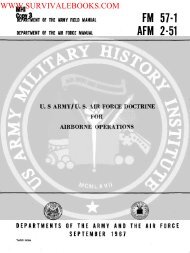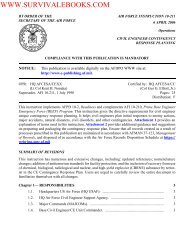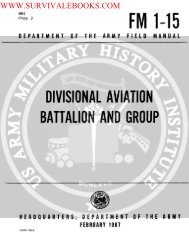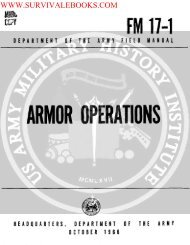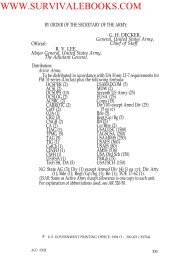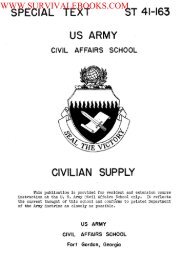1971 US Army Vietnam War OPERATORS ... - Survival Books
1971 US Army Vietnam War OPERATORS ... - Survival Books
1971 US Army Vietnam War OPERATORS ... - Survival Books
You also want an ePaper? Increase the reach of your titles
YUMPU automatically turns print PDFs into web optimized ePapers that Google loves.
WWW.SURVIVALEBOOKS.COMTM 9-1330-200-12/TM 1330-12/1AFigure 3-4. Adjustment of safety pin.(9) Fuze not correctly seated. Fuze shouldbe fully threaded into the grenade body and handtight.Inspect and adjust for correct seating of fuze, as follows:(a) Hold the fuzed grenade in palm ofhand with fuze up (1, fig. 3-6.1).(b) Turn fuze in a clockwise directionuntil handtight (2, fig. 3-6.1).b. Inspect unpacked rifle grenades periodically forthe following:(1) Rust or corrosion on body and stabilizer.Lightly rusted or corroded grenade bodies areserviceable and may be launched. A grenade with anyrust or corrosion on the stabilizer is unserviceable andshould be turned over to authorized disposal personnel.A grenade with a dented nose projection cap isunserviceable and should be turned over to authorizeddisposal personnel.(2) Moisture on inside of stabilizer tube.(3) Condition of nose protection cap (fig. 3-7).(4) Presence of safety clip (Rifle GrenadesM22 Series) and presence of safety wire (RifleGrenades M19A1). Absence of these items is a criticaldefect and ammunition disposal personnel should benotified.(5) Presence of tape in nose vent (RifleGrenades M23 Series) and presence of nose closingplug (Rifle Grenades M22 Series).(6) Dents and deformation in stabilizer tubeand fin assembly (fig. 3-8).c. Inspect unpacked smoke screening grenades,L8A1 and L8A3 periodically. Dispose of grenadescontaining the following defects:(1) Metal base punctured.(2) Rubber body torn or dry rotted.(3) Electrical contact, corroded or bent.Change 12 3-5




